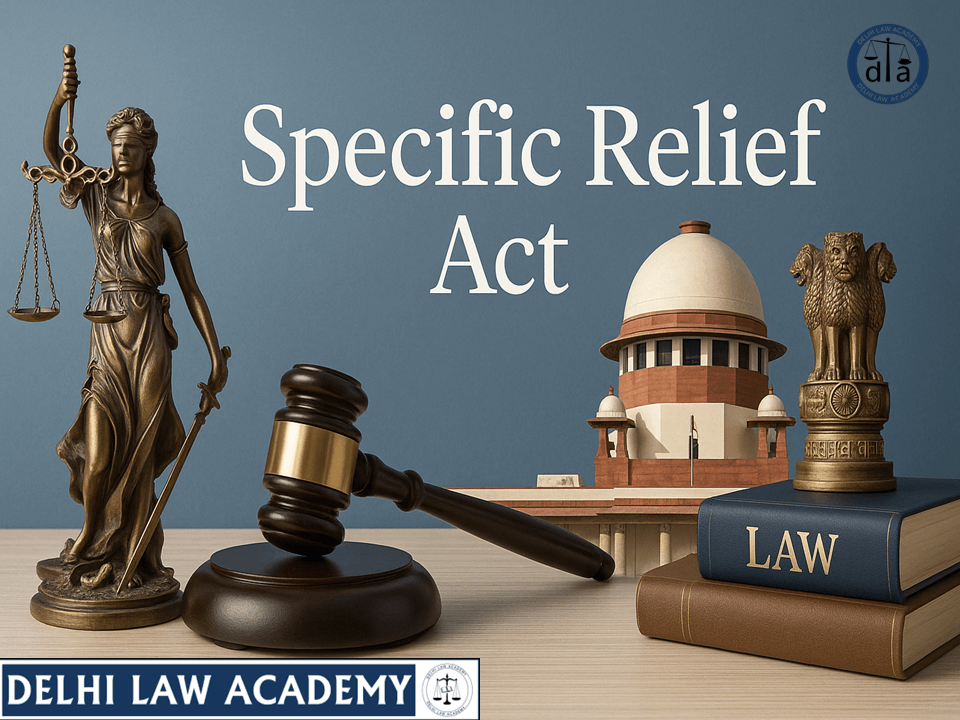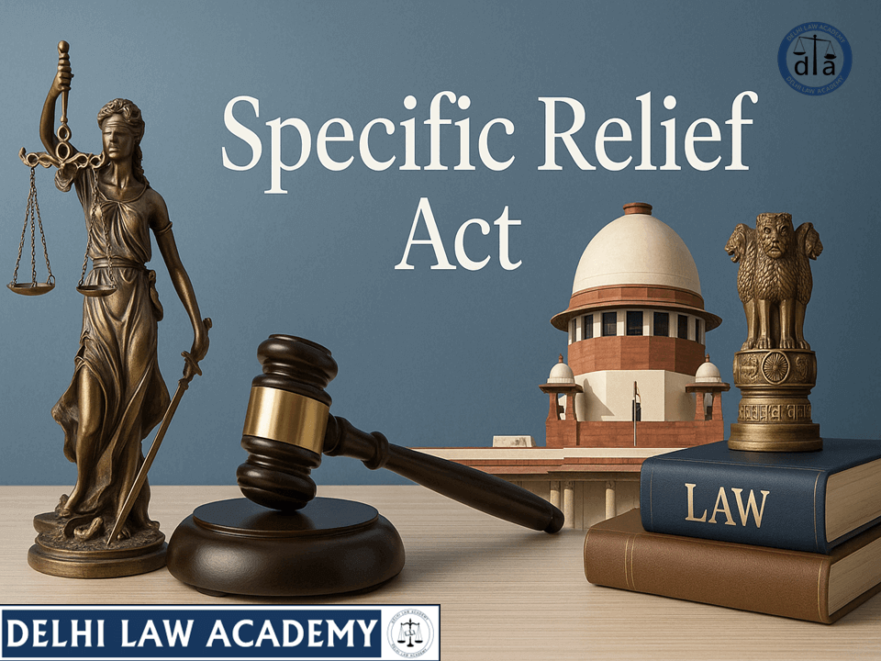
📜 Specific Relief Act: Section 16 & Substituted Performance of Contract
Delhi Law Academy Jaipur presents below for aspirants of RJS, DJS, PCS (J), and other Judicial Services throughout India a detailed explanation of Section 16 and substituted performance provisions under the Specific Relief Act.
❓ Section 16: Readiness & Willingness to Perform
Question: How to construe a plea of “readiness and willingness to perform” to subserve to the requirement of Section 16(c)?
Answer:
- Supreme Court in JP Builders v. A Ramadas Rao [2011 SC]: Section 16(c) mandates “readiness and willingness” of the plaintiff. “Readiness” refers to financial capacity; “willingness” refers to conduct of the plaintiff desiring performance.
- Supreme Court in Swami Ganesh Dassji v. Sita Ram Thapar [1996 SC]: Readiness = capacity to perform, including financial position; willingness = conduct scrutinized.
- Supreme Court in C.S. Venkatesh v. A.S.C. Murthy [2020 SC]: Not necessary to produce ready money but mandatory to prove means to generate consideration amount.
Judgments considered:
- JP Builders v. A Ramadas Rao [2011 SC]
- Swami Ganesh Dassji v. Sita Ram Thapar [1996 SC]
- Atma Ram v. Charanjit Singh [2020 SC]
- P Meenakshisundaram v. P Vijayakumar [2018 SC]
- Syed Dastagir v. T.R. Gopalakrishna [1999 SC]
- C.S. Venkatesh v. A.S.C. Murthy [2020 SC]
📌 Substituted Performance of Contract (Section 20)
Section 20(1)
- Without prejudice to Indian Contract Act 1872, except as agreed by parties
- Where contract is broken by non-performance, party suffering breach may opt for substituted performance via third party or own agency, recovering expenses from breaching party
Section 20(2)
- No substituted performance unless 30-day written notice is given to breaching party
- If party in breach refuses/fails, then performance via third party or own agency allowed
Proviso
- Expenses/costs recoverable only if contract performed via third party or own agency
Section 20(3)
- If contract performed via third party/own agency after notice, cannot claim specific performance against breaching party
Section 20(4)
- Does not prevent claiming compensation from party in breach
🕰 Old Section 20 (Pre 1.10.2018)
Discretion as to decreeing specific performance: jurisdiction discretionary, not bound to grant relief merely because lawful; guided by judicial principles.
Judicial Principles:
- Nirmala Anand v. Advent Corporation [2002 SC]: Court may impose reasonable conditions; extraordinary price increase does not deny relief; undue advantage to one party must be avoided
- Shenbagam v. K.K. Rathinavel [2022 SC]: Delay, inconsistent conduct, lack of communication = indicative of lack of willingness. Readiness = financial capacity to pay balance consideration; burden on plaintiff to prove readiness and willingness.
⚖️ SPECIFIC RELIEF ACT: SECTION 16
Question:
• How to construe a plea of “readiness and willingness to perform” to subserve to the requirement of Section 16(c)?
Ans:
Supreme Court in JP Builders v. A Ramadas Rao [2011 SC]
• Section 16(c) mandates “readiness and willingness” of the plaintiff. “Readiness” refers to the financial capacity and “willingness” refers to the conduct of the plaintiff wanting the performance.
Supreme Court in Swami Ganesh Dassji v. Sita Ram Thapar [1996 SC]
• By readiness may be meant the capacity of the plaintiff to perform the contract which includes his financial position to pay the purchase price.
• For determining his willingness to perform his part of the contract, the conduct has to be properly scrutinised.
Supreme Court in C.S. Venkatesh v. A.S.C. Murthy [2020 SC]
• It is not necessary for the plaintiff to produce ready money but it is mandatory on his part to prove that he has means to generate consideration amount.
📜 Supreme Court Judgments Considered in this Post:
- JP Builders v. A Ramadas Rao [2011 SC]
- Swami Ganesh Dassji v. Sita Ram Thapar [1996 SC]
- Atma Ram v. Charanjit Singh [2020 SC]
- P Meenakshisundaram v. P Vijayakumar [2018 SC]
- Syed Dastagir v. T.R. Gopalakrishna [1999 SC]
- C.S. Venkatesh v. A.S.C. Murthy [2020 SC]
🎯 Preparation for RJS, DJS, PCS(J) and Other Judicial Service Exams
SPECIFIC RELIEF ACT EXPLAINED
The Specific Relief Act is an important component of any and every Judicial Service exam in the country. Its thorough knowledge is a must for all aspirants of RJS, DJS, PCS (J) and every other Judicial Service exam. To help such aspirants, Delhi Law Academy Jaipur has launched a series of study material modules on all important aspects of this important part of their syllabus.
📘 Section 16 – Personal Bars to Relief
[**As amended by the Amendment Act 2018]- Specific performance of a contract cannot be enforced in favor of a person
- (a) who has obtained substituted performance of contract u/s 20
- (c) who fails to prove that he has performed or has always been ready and willing to perform essential terms of the contract which are to be performed by him, other than terms the performance of which has been prevented or waived by the defendant
Explanation:
For purposes of clause (c):
- (1) Where a contract involves payment of money: it is not essential for the plaintiff to actually tender to the defendant or to deposit in court any money except when so directed by the court.
- (2) Plaintiff must prove performance of the contract or readiness and willingness to perform the contract according to its true construction.
📝 DLA Note on Section 16(c)
JP Builders v. A Ramadas Rao [2011 SC]
• Section 16(c) mandates “readiness and willingness” of the plaintiff and is a condition precedent to obtain the relief of specific performance.
• Readiness to perform must be established throughout the relevant points of time. “Readiness and willingness” has to be determined from the conduct of the parties.
• “Readiness” refers to the financial capacity and “willingness” refers to the conduct of the plaintiff wanting the performance.
His Holiness Acharya Swami Ganesh Dassji v. Sita Ram Thapar [1996 SC]
• There is a distinction between readiness and willingness to perform the contract.
• The court may infer from the facts and circumstances whether the plaintiff was ready and willing to perform his part of the contract.
• In this case, the petitioner lacked financial capacity and intended to bide for time, thus disentitling him to relief.
Atma Ram v. Charanjit Singh [2020 SC]
• The conduct of the plaintiff is crucial in a suit for specific performance.
• Delay in instituting a suit or inconsistent behaviour may disentitle the plaintiff from the discretionary relief of specific performance.
P Meenakshisundaram v. P Vijayakumar [2018 SC]
• Plaintiff must plead and prove readiness and willingness from the date of contract till the hearing of the suit.
• Lack of communication or inaction by the plaintiff can show lack of willingness.
Syed Dastagir v. T.R. Gopalakrishna [1999 SC]
• A plea of readiness and willingness need not use specific words — it must show the spirit and substance of compliance.
• Pleadings are not about form but essence — courts must infer intention from the whole pleading.
C.S. Venkatesh v. A.S.C. Murthy [2020 SC]
• To determine readiness and willingness, the court must consider conduct before and after the suit.
• Plaintiff need not produce ready cash but must prove capacity to generate consideration.
📚 Continue Your Specific Relief Act Preparation
Don’t stop here! Strengthen your knowledge of the SRA with our other fully solved tests:
📘 Free Study Material for Judiciary Aspirants!
Download our FREE study material prepared by Delhi Law Academy’s expert faculty.
📘 FAQs on Section 16 & Substituted Performance of Specific Relief Act
Supreme Court in JP Builders v. A Ramadas Rao [2011 SC]: “Readiness” refers to the plaintiff’s financial capacity and “willingness” refers to the conduct showing intent to perform the contract.
Supreme Court in Swami Ganesh Dassji v. Sita Ram Thapar [1996 SC]: Willingness is determined by scrutinizing the conduct of the plaintiff to ensure they genuinely want to perform their contractual obligations.
Supreme Court in C.S. Venkatesh v. A.S.C. Murthy [2020 SC]: No, the plaintiff must prove they have the means to generate the consideration amount; actual ready cash is not required.
Section 20(1)–(4): The party suffering breach may get the contract performed through a third party or by their own agency after giving a 30-day notice to the party in breach, and recover expenses incurred. Specific performance cannot be claimed against the party in breach if substituted performance is undertaken.
Section 20(4): No, the party who suffers breach can still claim compensation from the party in breach even if they have undertaken substituted performance.
Shenbagam v. K.K. Rathinavel [2022 SC]: The court examines the conduct, communication, delay, and financial readiness of parties. Readiness and willingness must exist throughout, and the remedy should not cause injustice.
Contact us
📍 Delhi Law Academy – Jaipur Branch
6C, Tower 2, Coaching Hub, Pratap Nagar, Jaipur – 302033
📞 Phone:
+91 9911916552
+91 8447285606
✉️ Email:
contactus@delhilawacademy.com

